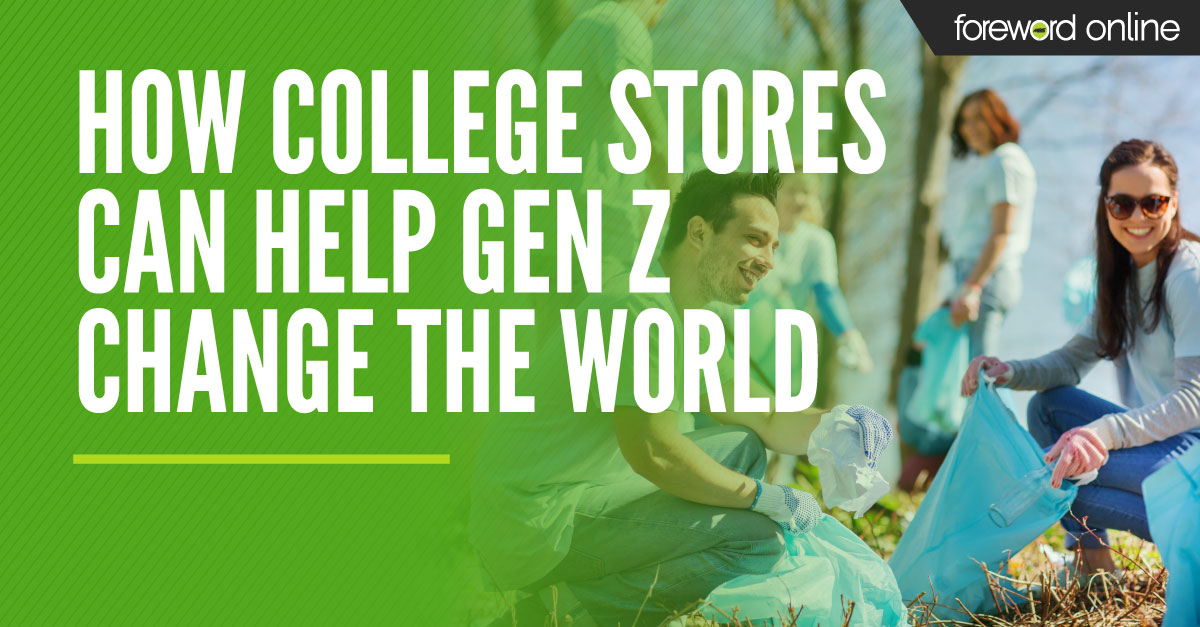As a campus store professional, you’ve probably noticed a defining characteristic of Gen Z students: They care about the world. These young people are tuned into what’s happening, and they want to make a difference. One way campus stores can foster that drive is to draw on your connection with the larger community. Become a hub that introduces students to local volunteer opportunities.
Make your store a Gen Z community service gateway
Many students want to do community service, but they don’t know where to begin. If they’re new to town, finding the right contacts can be especially challenging.
That’s where college stores come in. Get in touch with local organizations that rely on volunteers and ask how you can help get the word out to students. Look for apolitical groups that appeal to people with a variety of views and beliefs. That will ensure your social action doesn’t alienate students with different views.
With a customer base composed of diverse campus stakeholders, your store is perfectly positioned to promote volunteer groups. Create a bulletin board devoted to volunteer opportunities. Keep brochures from the organizations beside the cash register. Or, invite one or more organizations to your store for an event.
Volunteer work can further happiness, reduce stress and boost success. William & Mary Bookstore hosts a de-stress event with the local animal shelter for finals each term. The store brings in rescue dogs and cats throughout the week. As students stop by to spend time with the animals, it relieves their stress while helping the animals get some much-needed love.
Here are a few suggestions for organizations campus stores can promote:
- Welcome groups — Local organizations devoted to helping refugees resettle often need volunteers. These workers might serve as guides, ESL tutors or cultural ambassadors that help newcomers get to know our America. Volunteer work like this can be a great opportunity for a student to build resume-worthy international experience. Plus, the chance to connect to people from all parts of the world is its own reward.
- Animal shelters — Contact with animals fuels a sense of connection and well-being. Psychologists call it the “pet effect.” If your local animal shelters need volunteers, let students know. Shelters almost always need extra animal-lovers on hand.
- Mentor services — Many organizations that serve underrepresented youth seek volunteers. These workers might serve as mentors or as friends who offer kids compassion and positive feedback. Such connections can transform the lives of both the child and the mentor.
- Urban gardens — Some communities have volunteer-run urban gardens that serve a variety of purposes. They introduce neighborhood kids to nutritious food. They offer a common ground for neighborhood connection. They teach kids (and adults) the basics of the natural world. And they give volunteers the sense of well-being that comes from connecting to the earth.
- Environmental groups — Local organizations that look after neighborhood parks and environmental treasures often need unpaid assistants. Young people who devote a Saturday to trash pick-up or tree trimming learn about the local ecology and engage in hands-on work. It’s great for students to alternate studying with physical activity that brings a concrete sense of reward. It relieves stress, builds focus and furthers the kind of confidence that fuels academic achievement.
What makes Gen Z activism different
As you research local service groups, keep in mind what makes the Gen Z experience different. Every generation is partly defined by its views of progress. Boomers rejected conformity and embraced ideals. Gen X rejected “selling out” and demanded authenticity. Millennials looked within and sought to “be the change you want to see in the world.”
But Gen Z’s activism is distinct. These young people grew up in the unbounded space of the internet. This has fostered new forms of collaboration, networking and empathy. Old-fashioned boundaries don’t make sense to kids raised on smartphones.
Commercial vs. cool, indie vs. mainstream, expert vs. amateur, male vs. female, black vs. white: simplistic polarities fall apart when you’re used to having a window to the world in the palm of your hand.
Gen Z doesn’t think of stores, brands or businesses as limited commercial entities. Research shows they favor brands that share their values and align with social causes. College stores that take part in finding solutions to shared problems will inspire loyalty.
Giving Gen Z ways to volunteer will boost health and happiness
Of course, Gen Z students’ social awareness can be a cause of stress. Barnes & Noble College research into student happiness has found that 86 percent of students report anxiety.
When students were asked which social issues worry them most:
>>60% said the health of the environment
>>58% said gun violence and mass shootings
>>54% said the ability to pay for college
>>47% said racial injustice and equality
>>46% said division within our nation.
These kids have a lot on their shoulders. Activities that make a tangible difference in the lives of others can provide an essential sense of agency. Volunteering is empowering. Many psychologists recommend volunteer work for those who have experienced traumatic events.
Let your Gen Z customer preferences inspire you. Become a nexus that promotes harmony, community and student empowerment. You may find the rewards go far beyond the bottom line.



.jpg)

